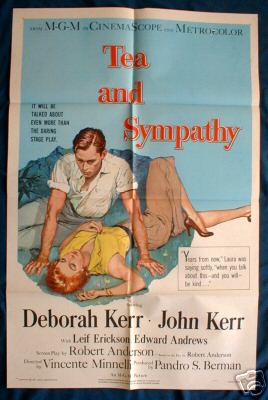- Tea and Sympathy
"Tea and Sympathy" is a 1953 stage play in three acts by Robert Anderson.
The Play
Broadway premiere
It received its premiere on Broadway at the
Ethel Barrymore Theatre onSeptember 30 ,1953 in a production byThe Playwrights' Company , directed byElia Kazan and designed byJo Mielziner . The play starredDeborah Kerr ,Leif Erickson and John Kerr. It transferred to theLongacre Theatre , and later the48th Street Theatre . It had a total run of 712 performances. During the run,Joan Fontaine andAnthony Perkins took over the roles played by Deborah Kerr and John Kerr.London
The play was first performed in
London at theComedy Theatre under membership conditions, because of the ban imposed by theLord Chamberlain .Paris
A French adaptation was presented at the Théâtre de Paris,
Paris starringIngrid Bergman andJean-Loup Phillipe and directed by Jean Mercure.The Film
Infobox Film
name = Tea and Sympathy

image_size =
caption = Original film poster
director =Vincente Minnelli
producer =Pandro S. Berman
writer = Robert Anderson
narrator =
starring =Deborah Kerr
Leif Erickson
John Kerr
music =Adolph Deutsch
cinematography =John Alton
editing =Ferris Webster
distributor =MGM
released = flagicon|USA27 September 1956
runtime = 122 min
country = USA
language = English
budget =
preceded_by =
followed_by =
website =
amg_id =
imdb_id = 0049829The play was adapted by Robert Anderson into a 1956 film directed byVincente Minnelli and produced byPandro S. Berman forMGM . The music score was byAdolph Deutsch and the cinematography byJohn Alton .Deborah Kerr , Leif Erickson and John Kerr recreated their original stage roles. Also in the cast wereEdward Andrews ,Darryl Hickman ,Norma Crane ,Tom Laughlin , andDean Jones .Plot
Tom Robinson Lee (John Kerr), a 17-year old student at a boy's prep school, is having difficulties fitting in with the other boys who like sports, talking about girls, and listening to pop music. He prefers classical music, reads books, can sew, goes to the theater, and generally seems to be more at ease in the company of women.
The other boys torment him for his "unmanly" qualities and call him "sister boy", and he is treated ruthlessly by his father, Herb Lee (Edward Andrews), who believes a man should be manly. Only Al (Darryl Hickman), also a student at the prep school, treats Tom with any decency, perceiving that being different is not the same as being emasculate. This turbulance is noticed by Laura Reynolds (Deborah Kerr), the young wife of the House Master Bill Reynolds (Leif Erickson). She tries to build a connection with the young man, eventually even falling in love with him, presumably because of his similarity to her first husband John, who was killed in
World War II .The situation escalates when Tom visits the local prostitute to dispel the rumors about his sexuality, but is unable to have intercourse with her. This failure prompts him to attempt suicide and he also has to leave the school because of his visit with her. He and Laura eventually have sex, prompting Laura to leave her husband.
The film opens and closes ten years into the future, when the adult Tom, who is now a successful writer and also married, visits his college at a reunion.
Analysis
The character of Tom can be interpreted to be either
homosexual or maybe just a somewhat effeminateheterosexual . Since theHays code was in effect when the film was produced, this possibility of a double reading was probably intentional. Of course the central message of the film, that it is OK to be different, remains fundamentally the same, no matter what one reads into the main character'ssexual orientation .In addition to Tom, the movie also features two other characters whose possible homosexual tendencies are delineated in such a subtle way that their portrayals may have been under the radar for 1950s audiences as well as censors: The first character is Tom's roommate, who, while a jock, does not have any experiences with girls nor apparently any eagerness to make them and who also defends Tom in a way that suggests sexual attraction. Being too simple-minded to enjoy Tom's pursuits like classical music or to consciously recognize his own hidden motivations, he is also somewhat protected from closer scrutiny by his surroundings as he seems to be like the other boys at the surface.
The second character is Bill, Laura's second husband, who seems to have lost all sexual interest in his wife after their first few weeks of marriage and now prefers to be together with her as little as possible in lieu of hanging out "with the boys". It is suggested that Bill also experienced a sexual identity crisis in his teenage years and at one point he even jokes that his outward appearance of heterosexual masculinity is a built-up façade. In the play, there is also a final confrontation between him and Laura about his latent homosexuality. So while Tom Lee is the obvious target for harassment because of his actual or presumed homosexuality, the movie also presents other characters who have "adapted" to society's expectations despite their apparent sexual inclinations.
External links
*
*
Wikimedia Foundation. 2010.
